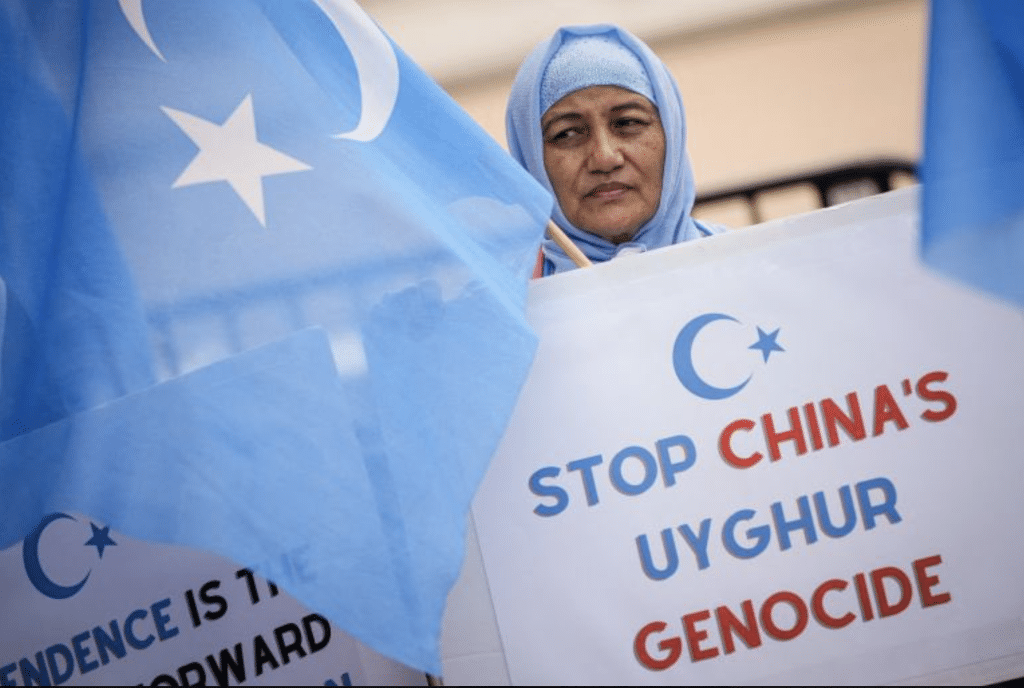China’s policies toward its Uyghur minority have long been condemned by international observers, human rights organizations, and governments worldwide.
Under the leadership of MA Xingrui, Communist Party Secretary of the Xinjiang Uyghur Autonomous Region, the persecution of Uyghurs has not only persisted but worsened.
Despite initial hopes that Ma’s technocratic background would introduce a more moderate approach, exiled Uyghurs and international observers agree that his tenure has intensified repression, expanded forced labor, and extended persecution beyond Xinjiang’s borders.
These actions not only illustrate a continued erosion of basic human rights but also highlight China’s unapologetic defiance of international accountability.
Uyghur activists and exiles point to clear evidence of worsening conditions under MA Xingrui’s leadership.
Arbitrary detentions remain rampant, with estimates exceeding 1 million Uyghurs being held in “re-education” camps.
The international community must respond with more than condemnation. Concrete actions—such as targeted sanctions on officials like MA Xingrui, increased scrutiny of forced labor in global supply chains, and stronger support for Uyghur refugees—are critical to holding Beijing accountable.
These detentions, initially labeled as temporary measures, have transformed into long-term imprisonment, targeting Uyghur culture, identity, and religion.
Forced labor programs have also expanded, particularly in projects connected to China’s Belt and Road Initiative, a global infrastructure campaign central to Beijing’s geopolitical strategy.
Abduweli Ayup, a Norway-based Uyghur activist, details disturbing incidents of Uyghurs forcibly returned to Xinjiang after seeking refuge in cities like Beijing and Shanghai.
“These individuals were arrested and forcibly returned, where their fates remain uncertain,” Ayup explained, referencing trusted sources within China.
This demonstrates that Beijing’s oppressive policies are no longer confined to Xinjiang but extend nationwide, ensuring Uyghurs remain under constant surveillance and threat.
MA Xingrui’s leadership has exacerbated a systemic campaign of cultural erasure, seeking to dismantle Uyghur identity through oppressive measures.
Religious practices, like the wearing of headscarves, remain tightly controlled, with women like Madina Mehmet—who fled China—reporting coercion and humiliation.
Mehmet’s experience, where authorities pressured her to remove her headscarf during her time at Beijing Foreign Studies University, represents a broader assault on religious freedoms for Uyghurs.
What distinguishes MA Xingrui’s tenure is the geographical expansion of China’s repression. Uyghurs who attempt to escape scrutiny by relocating to other parts of China remain vulnerable to arbitrary arrest and detention.
This is exemplified in the case of Irpan Yarmemet, a Uyghur content producer who was arrested in Shanghai for his past travels to Turkey, a country now deemed “sensitive” by Chinese authorities.
Yarmemet’s subsequent transfer to Xinjiang underscores Beijing’s relentless efforts to monitor and suppress Uyghurs no matter where they reside.
Such persecution does not stop within China’s borders. Uyghur exiles report being harassed even after fleeing the country.
Madina Mehmet’s testimony highlights the extent of China’s reach: while living in Turkey, officials demanded proof of her student status.
Her relatives in Xinjiang faced repeated interrogations and detentions as Chinese authorities sought information about her activities abroad.
Tragically, Madina’s sister and cousin, accused without evidence of connections to “terrorist organizations,” were sentenced to prison terms exceeding seven years.
This relentless pursuit of Uyghurs abroad demonstrates Beijing’s disregard for international norms and its determination to silence dissent. Uyghurs living in exile—already grappling with trauma—find themselves surveilled, harassed, and threatened, while their families back home bear the brunt of China’s retaliation.
Under MA Xingrui, China has intensified its targeting of influential Uyghurs—those with wealth, status, or social capital.
The case of RehmutullaSemet, a prominent Uyghur businessman and real estate developer, epitomizes this tactic.
Sentenced to 19 years on fabricated charges of “assisting terrorist activities,” Semet’s imprisonment appears motivated not by evidence of wrongdoing but by his ethnicity and economic influence.
Semet’s assets, valued at over $400 million, were confiscated and auctioned on platforms like Douyin, China’s domestic version of TikTok.
Buildings he owned, including the iconic Gold Coin Hill Building in Urumqi, were seized and sold off by the government. Such actions reveal a broader strategy to strip Uyghurs of economic power, depriving them of avenues for social mobility and reinforcing systemic marginalization.
The targeting of prominent Uyghurs reflects Beijing’s deep fear of dissent and independence within minority communities.
By punishing influential figures and erasing their contributions, China seeks to stifle Uyghur voices while tightening its grip over the region’s economy and society.
What is happening in Xinjiang under MA Xingrui’s leadership can only be described as an orchestrated campaign of cultural erasure and systemic injustice.
Uyghur women, like Madina Mehmet’s sister, have been denied the right to practice their faith freely and pursue education without fear of harassment.
Families are separated, children grow up without parents, and entire communities are traumatized by the weight of Beijing’s surveillance and repression.
While China frames its policies in Xinjiang as counter terrorism measures, the reality points to an organized assault on a minority population.
Human rights organizations, the United States, and Canada have labeled China’s actions as genocide, and the European Union has condemned them as crimes against humanity.
Beijing’s narrative—centered on “combatting extremism”—rings hollow in the face of mounting evidence of mass detentions, cultural suppression, and forced labor.
The testimonies of Uyghur exiles like Madina Mehmet and Abduweli Ayup highlight the urgent need for international accountability.
The international community must reject complacency and demand justice for those who have suffered under China’s relentless persecution.
Despite overwhelming evidence, China continues to act with impunity, emboldened by economic influence and geopolitical leverage.
The international community must respond with more than condemnation. Concrete actions—such as targeted sanctions on officials like MA Xingrui, increased scrutiny of forced labor in global supply chains, and stronger support for Uyghur refugees—are critical to holding Beijing accountable.
Organizations like the United Nations must launch independent investigations, while governments must ensure Uyghur exiles are protected from harassment and deportation.
As Madina Mehmet powerfully states, “They’ve committed no crime. My sister’s children deserve to grow up with their mother.”
Her words serve as a stark reminder of the human cost of China’s policies in Xinjiang. Justice for the Uyghur people is long overdue, and the world must act before it is too late.
Under MA Xingrui’s leadership, China’s oppression has only deepened, extending across borders and leaving lasting scars on Uyghur families.
The international community must reject complacency and demand justice for those who have suffered under China’s relentless persecution.









Comment